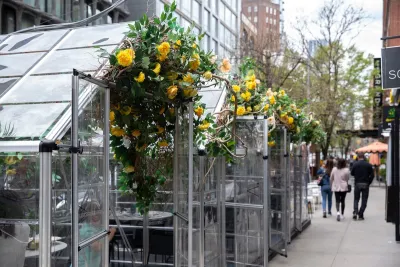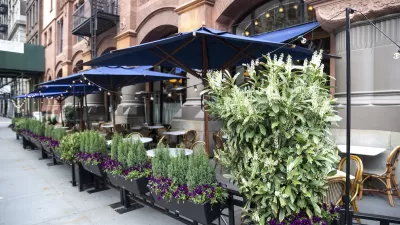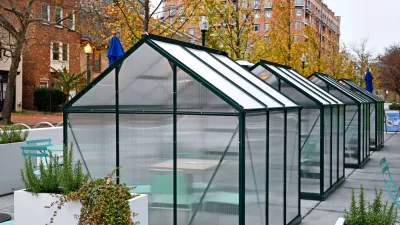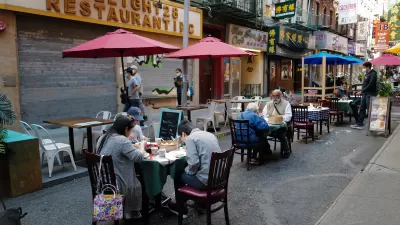Hundreds of restaurants will be unable to serve alcohol in their outdoor dining areas this summer due to a delay in permitting.

New York City restaurants hoping to serve alcohol in their outdoor dining areas will likely have to wait months, writes Kevin Duggan in Streetsblog NYC, “due to a gap in the city’s effort to fast-track a backlog in permitting as the opening of season kicks off in mere days, legal experts warned.”
Restaurants won’t be able to serve alcohol if the State Liquor Authority doesn’t accept the city’s “conditional approvals” for outdoor dining. So far, only 42 out of 3,500 applications have received a full DOT license.
According to one attorney who specializes in hospitality, outdoor dining without the option to serve alcohol is “not worthless, but pretty close” as far as revenue goes. The delay could last as long as four months, Duggan adds, impacting restaurants the most during the busy summer season.
Many NYC restaurants have already removed their outdoor dining setups after new city rules were put in place last year that drove up costs for businesses. Outdoor — or al fresco — dining boomed in popularity during the Covid-19 pandemic, when social distancing precautions prompted restaurants around the country to expand outdoor seating options. Yet as early as 2023, some cities began clawing back outdoor and curbside space or enacted prohibitively expensive or onerous regulations.
FULL STORY: ‘Disaster’: Outdoor Dining Snafu Could Ban Alfresco Booze For Months

Alabama: Trump Terminates Settlements for Black Communities Harmed By Raw Sewage
Trump deemed the landmark civil rights agreement “illegal DEI and environmental justice policy.”

Planetizen Federal Action Tracker
A weekly monitor of how Trump’s orders and actions are impacting planners and planning in America.

How Atlanta Built 7,000 Housing Units in 3 Years
The city’s comprehensive, neighborhood-focused housing strategy focuses on identifying properties and land that can be repurposed for housing and encouraging development in underserved neighborhoods.

In Both Crashes and Crime, Public Transportation is Far Safer than Driving
Contrary to popular assumptions, public transportation has far lower crash and crime rates than automobile travel. For safer communities, improve and encourage transit travel.

Report: Zoning Reforms Should Complement Nashville’s Ambitious Transit Plan
Without reform, restrictive zoning codes will limit the impact of the city’s planned transit expansion and could exclude some of the residents who depend on transit the most.

Judge Orders Release of Frozen IRA, IIJA Funding
The decision is a victory for environmental groups who charged that freezing funds for critical infrastructure and disaster response programs caused “real and irreparable harm” to communities.
Urban Design for Planners 1: Software Tools
This six-course series explores essential urban design concepts using open source software and equips planners with the tools they need to participate fully in the urban design process.
Planning for Universal Design
Learn the tools for implementing Universal Design in planning regulations.
Caltrans
Smith Gee Studio
Institute for Housing and Urban Development Studies (IHS)
City of Grandview
Harvard GSD Executive Education
Toledo-Lucas County Plan Commissions
Salt Lake City
NYU Wagner Graduate School of Public Service





























